Science
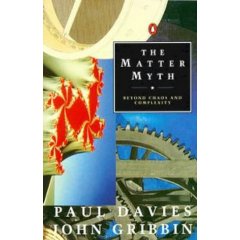
The Matter Myth: Towards Twenty First Century Science
by P. C. W. Davies
Synopsis
Bringing together articles written over the last ten years, this book covers all the areas with which Paul Davies’ books have been concerned – including quantum physics, superstrings, complexity and the relationship of theology and modern physics.
Best book of its kind, 27 Jul 1999
By A Customer
If anyone has even the slightest interest in modern physics from TV or otherwise then this book should be top of your shopping list. It covers with an appropriate amount of detail the transition from Newtonian determinism through the two main pillars of modern physics in the 20th century – quantum mechanics and general relativity. It is an intelligently written book drawing on the experience of two great science popularisers, giving it more scope in such areas, and in the metaphysics of the ‘birth of the Universe’. Particularly good, I feel, was the ‘Confessions of a Relativist’, the first hand experience of the difficult predictions of Relativity, and how such problems should be overcome.

The End of Science
by John Horgan
Review
In a series of interviews with luminaries of modern science, Scientific American senior editor John Horgan conducts a guided tour of the scientific world and where it might be headed in The End of Science. The book, which generated great controversy and became a bestseller, now appears in paperback with a new afterword by the author. Through a series of essays in which he visits with such figures as Roger Penrose, Stephen Jay Gould, Stephen Hawking, Freeman Dyson and others, Horgan captures the distinct personalities of his subjects while investigating whether science may indeed be reaching its end. While this book is in no way dumbed down, it is accessible and can take the general reader to the outer edges of scientific exploration. –This text refers to an out of print or unavailable edition of this title.
TES
‘A fine example of popular science writing. Accessible, argumentative, stimulating, informative…’
Physic & Philosophy
by Sir James Jeans
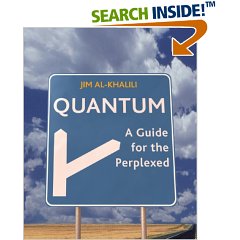
Quantum: A Guide for the Perplexed
by Jim al-Khalili
Product Description
Quantum mechanics is the most fundamental scientific theory known to man. It underpins modern science and technology and even provides us with a blueprint for reality itself. And yet it has been said that if you think you understand it, you quite clearly don’t. But is quantum physics really so unknowable? Is reality really so strange? And just how can cats be half alive and half dead at the same time? This book untangles the weirdness of the quantum world, explains the theories, explores their consequences and presents a cutting-edge guide to the current state of the science.
Synopsis
Quantum mechanics is the most fundamental scientific theory known to man. It underpins modern science and technology and even provides us with a blueprint for reality itself. And yet it has been said that if you think you understand it, you quite clearly don’t. But is quantum physics really so unknowable? Is reality really so strange? And just how can cats be half alive and half dead at the same time? This book untangles the weirdness of the quantum world, explains the theories, explores their consequences and presents a cutting-edge guide to the current state of the science.
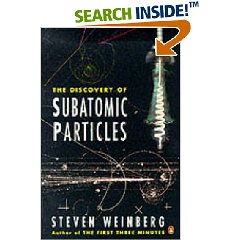
The Discovery of Subatomic Particles
by Steven Weinberg
Synopsis
The story of the discovery of the constituents of the atom, the electron, the proton and the neutron, written by a Nobel Prize-winner. An appendix sets out the basic maths, and handy “flashbacks” fill in the background, but Weinberg’s focus is always on current developments.
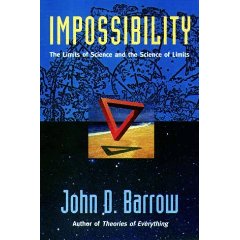
Impossibility: The Limits of Science and the Science of Limits
by John D. Barrow
Synopsis
In Impossibility, John D. Barrow–one of our most elegant and accomplished science writers–argues convincingly that there are limits to human discovery, that there are things that are ultimately unknowable, undoable, or unreachable. Barrow first examines the limits of the human mind: our brain evolved to meet the demands of our immediate environment, and much that lies outside this small circle may also lie outside our understanding. He investigates practical impossibilities, such as those imposed by complexity, uncomputability, or the finiteness of time, space, and resources. Is the universe finite or infinite? Can information be transmitted faster than the speed of light? The book also examines deeper theoretical restrictions on our ability to know, including Godel’s theorem, which proved that there were things that could not be proved. Finally, having explored the limits imposed on us from without, Barrow considers whether there are limits we should impose upon ourselves. Weaving together this intriguing tapestry, Barrow illuminates some of the most profound questions of science, from the possibility of time travel to the very structure of the universe.
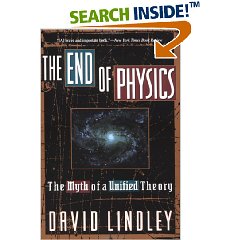
The End of Physics: The Myth of a Unified Theory�
by David Lindley
Synopsis
For more than a century physicists have hoped that they were closing in on the Holy Grail of modern science: a unified theory that would make sense of the entire physical world, from the subnuclear realm of quarks and gluons to the very moment of creation of the universe. The End of Physics is a history of the attempts to find such a theory of everything; a forceful argument it will never be found; and a warning that the compromises necessary to produce a final theory may well undermine the rules of good science. At the heart of Lindleys story is the rise of the particle physicists and their attempts to reach far out into the cosmos for a unifying theory. Working beyond the grasp of the largest telescopes or the most powerful particle accelerators, and unable to subject their findings and theories to experimental scrutiny, they have moved into a world governed entirely by mathematical and highly speculative theorizing, none of which can be empirically verified. Lindley argues that a theory of everything derived from particle physics will be full of untestedand untestableassumptions. And if physicists yield to such speculation, the field will retreat from the high ground of science, becoming instead a modern mythology. This would mean the end of physics as we know it.

The Cold War and the Making of the Modern World�
by Martin Walker
Synopsis
In this history of the Cold War, award-winning political commentator Martin Walker explains it as an economic and political dynamic that determined the structure of the modern global economy. Using recently-opened Kremlin archives and his own experience as “The Guardian”‘s bureau chief in Moscow during perestroika and in Washington during the Bush years, Walker analyzes what, more than any other single strategic conflict, has shaped the modern world.
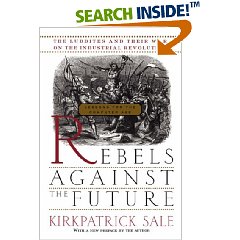
Rebels Against the Future: The Luddites and Their War on the Industrial Revolution: Lessons for the Computer Age
by Kirkpatrick Sale
Synopsis
Kirkpatrick Sale is at the tumultuous center of a technology backlash, actively challenging Bill Gates on the one hand and the Unabomber on the other. The subject of bets, barbs, and grudging praise in the pages of WIRED, The New York Times, Newsweek, and The New Yorker, Rebels Against the Future takes us back to the first technology backlash, the short-lived and fierce Luddite rebellion of 1811. Sale tells the compelling story of the Luddites struggle to preserve their jobs and way of life by destroying the machines that threatened to replace them; he then invokes a new-Luddite spirit in response to todays technological revolution and calls for another sort of rebellion: not one of violence but rather of intellectually and ethically sound protest.